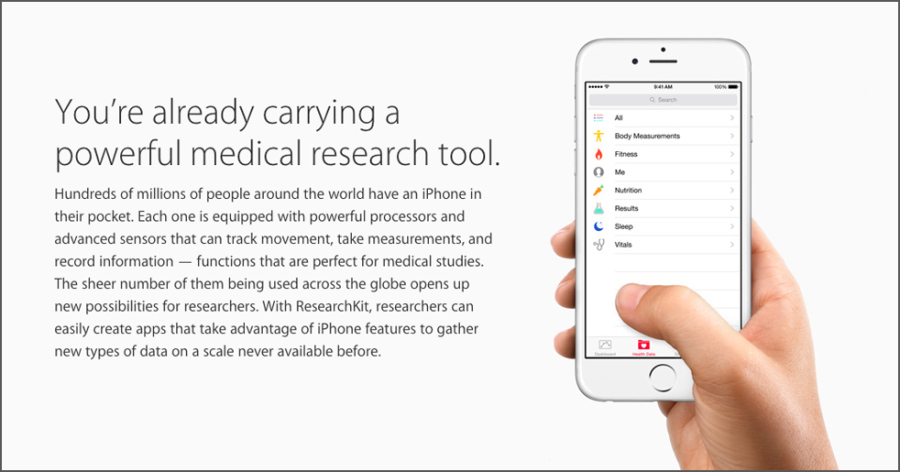

By Gadjo Cardenas Sevilla
It's been a week since Apple held a special event to reintroduce Apple Watch and launch new MacBooks. One game-changing revelation during that event was the introduction of the ResearchKit framework, which can help researchers gather and process information for clinical studies and cast a wider net using iPhones as research terminals.
While probably not as sexy as the re-engineered MacBook or as exciting as the Watch, ResearchKit is a potentially life-saving implementation of mobile technology, one that researchers and doctors say can supercharge the collection of medical data from, 'once every three months, to data that is collected every second.'
With 700 million iPhones in the wild right now capable of being used as medical data collection devices to help solve specific diseases and health problems, the potential is huge and is definitely something that a company with Apple's resources and influence can spearhead as a large scale project. Figthing various diseases has been a race against time and because of ResearchKit, it looks like we may get more time on our side.
Doctors can now, 'directly engage unprecedented numbers of inviduals in large geographic areas, many of which were unable to participate in research,' according to Dr. Ray Dorsey of the Rochester Medical Centre.
Based on the video shown during the event and on the livestream (see above), ResearchKit will allow the creation of specific surveys, questionnaires and even tactile, video or voice tests to be carried out across iPhones and the results of these tests can be instantaneously sent back to the source for quick processing. On the surface, this promises a constant and renewable source for scientists and doctors to gather the information they need in an almost realtime fashion.
This really puts people at the centre of medical research and could result in medical breakthroughs sooner rather than later. What got my attention is how Researchkit, which was borne from Apple's work on HealthKit and Health app, looks like a cohesive and pretty polished framework.
It really looks like it is ready to go and should be deployed in a relatively short period of time. 10,000 users signed up for ResearchKit within 24-hours of its availability, a number that some say would have taken three years in through regular canvassing.
Early adoption includes five academic centers that have already developed apps that can use the iPhone’s accelerometers, gyroscopes and GPS sensors to track the progression of chronic conditions like Parkinson’s disease and asthma. Bluetooth add-like heart-rate monitors, inhalers and other medical devices can also factor-in to gather accurate and disease specific information.
My hope is that more countries and medical institutions can adopt ResearchKit data into their current studies, and that this is will be just thebeginning of a movement that can really revolutionize medical research and shorten the time for developing cures and solutions to our more threatening medical conditions.
If ResearchKit proves to be successful on the iPhone, and I don't doubt that it will, it will be good to see it evolve as a cross platform solution, possibly available as an iCloud service or even an app running on other smartphones or devices.